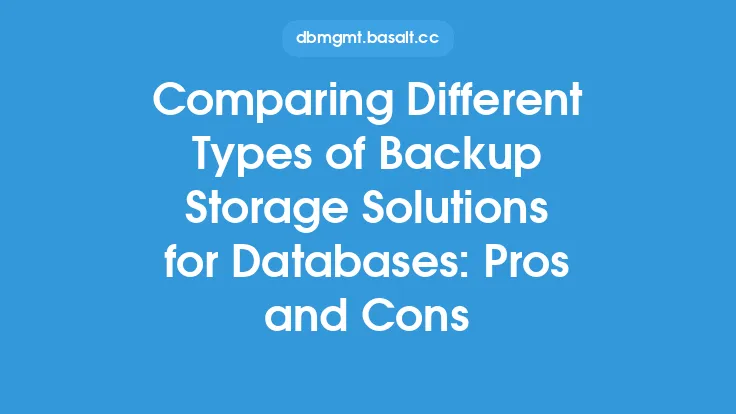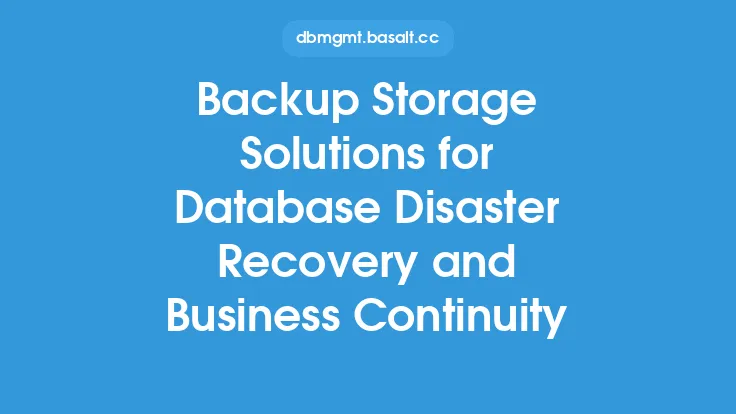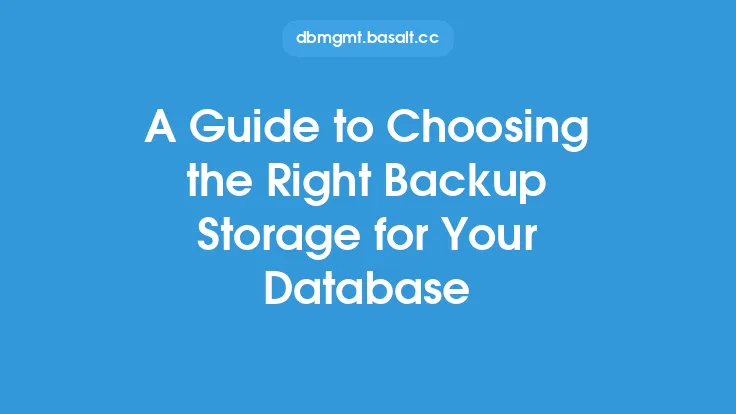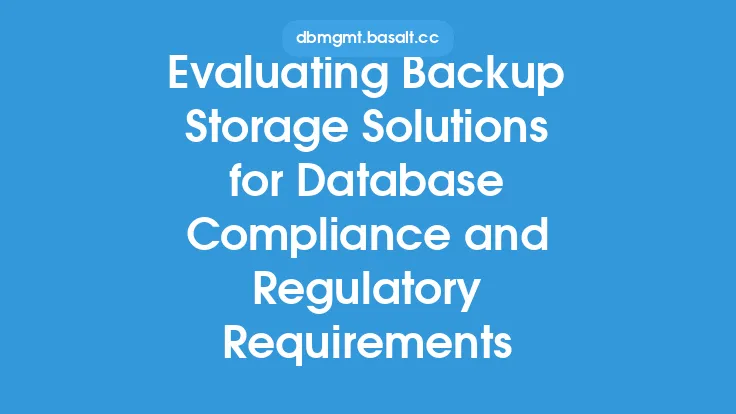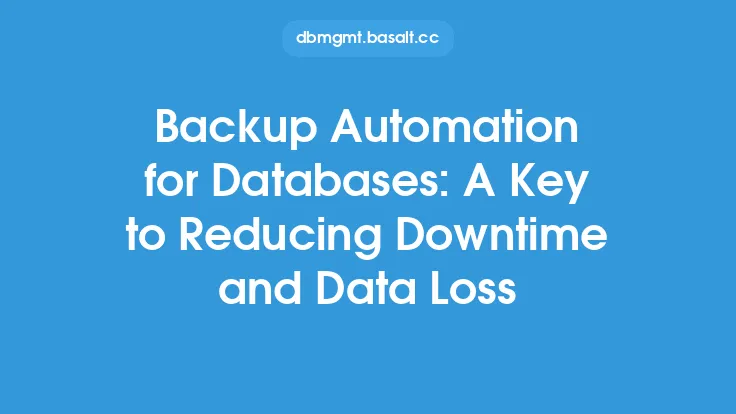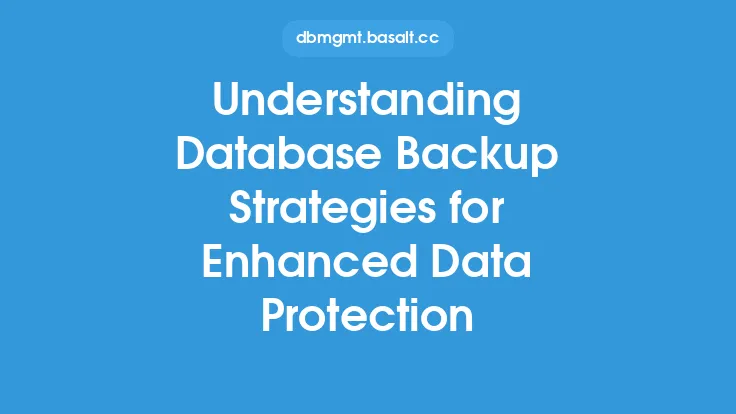When it comes to database management, one of the most critical aspects is ensuring the integrity and availability of data. This is where backup storage solutions come into play. Backup storage solutions are designed to provide a secure and reliable way to store database backups, allowing organizations to recover their data in the event of a disaster or data loss. In this article, we will delve into the world of backup storage solutions for databases, exploring the different types of solutions available, their key features, and the benefits they offer.
Introduction to Backup Storage Solutions
Backup storage solutions are specialized storage systems designed to store and manage database backups. These solutions can be implemented on-premise, in the cloud, or as a hybrid model, depending on the organization's specific needs and requirements. The primary goal of a backup storage solution is to provide a secure and reliable way to store database backups, ensuring that data can be recovered quickly and efficiently in the event of a disaster or data loss. Backup storage solutions typically offer a range of features, including data compression, encryption, and deduplication, which help to optimize storage capacity and reduce the risk of data loss.
Types of Backup Storage Solutions
There are several types of backup storage solutions available, each with its own strengths and weaknesses. Some of the most common types of backup storage solutions include:
- Disk-based backup storage solutions: These solutions use disk storage to store database backups. Disk-based solutions are fast and offer high performance, making them ideal for organizations that require rapid recovery times.
- Tape-based backup storage solutions: These solutions use tape storage to store database backups. Tape-based solutions are often used for long-term data retention and archiving, as they offer a cost-effective and reliable way to store large amounts of data.
- Cloud-based backup storage solutions: These solutions use cloud storage to store database backups. Cloud-based solutions offer scalability, flexibility, and cost-effectiveness, making them ideal for organizations that require a high degree of flexibility and scalability.
- Hybrid backup storage solutions: These solutions combine on-premise and cloud-based storage to store database backups. Hybrid solutions offer the benefits of both on-premise and cloud-based storage, including scalability, flexibility, and cost-effectiveness.
Key Features of Backup Storage Solutions
Backup storage solutions typically offer a range of key features that help to optimize storage capacity, reduce the risk of data loss, and ensure rapid recovery times. Some of the most common key features of backup storage solutions include:
- Data compression: This feature reduces the size of database backups, helping to optimize storage capacity and reduce the amount of data that needs to be transferred.
- Data encryption: This feature ensures that database backups are encrypted, helping to protect sensitive data from unauthorized access.
- Data deduplication: This feature eliminates duplicate data, helping to optimize storage capacity and reduce the amount of data that needs to be stored.
- Automated backup and recovery: This feature automates the backup and recovery process, helping to ensure that database backups are created regularly and can be recovered quickly and efficiently.
Benefits of Backup Storage Solutions
Backup storage solutions offer a range of benefits, including:
- Improved data protection: Backup storage solutions help to protect database data from loss or corruption, ensuring that organizations can recover their data quickly and efficiently in the event of a disaster or data loss.
- Rapid recovery times: Backup storage solutions help to ensure rapid recovery times, minimizing downtime and ensuring that organizations can get back up and running quickly.
- Cost savings: Backup storage solutions can help to reduce costs associated with data storage and management, as they offer a range of features that help to optimize storage capacity and reduce the risk of data loss.
- Scalability and flexibility: Backup storage solutions can be scaled up or down to meet the changing needs of organizations, offering a high degree of flexibility and scalability.
Technical Considerations
When implementing a backup storage solution, there are several technical considerations that need to be taken into account. These include:
- Storage capacity: The storage capacity of the backup storage solution needs to be sufficient to store all database backups, as well as any additional data that may be required.
- Performance: The performance of the backup storage solution needs to be sufficient to handle the demands of database backup and recovery, including data transfer rates and recovery times.
- Security: The security of the backup storage solution needs to be sufficient to protect sensitive data from unauthorized access, including encryption, access controls, and authentication.
- Compatibility: The backup storage solution needs to be compatible with the database management system and any other systems that may be used, including operating systems, hardware, and software.
Best Practices for Implementing Backup Storage Solutions
When implementing a backup storage solution, there are several best practices that need to be followed. These include:
- Developing a backup strategy: A backup strategy needs to be developed that takes into account the organization's specific needs and requirements, including data retention policies, recovery time objectives, and recovery point objectives.
- Testing backup and recovery processes: Backup and recovery processes need to be tested regularly to ensure that they are working correctly and that data can be recovered quickly and efficiently.
- Monitoring backup storage solutions: Backup storage solutions need to be monitored regularly to ensure that they are functioning correctly and that any issues are identified and resolved quickly.
- Training personnel: Personnel need to be trained on the use and management of backup storage solutions, including backup and recovery processes, to ensure that they are able to recover data quickly and efficiently in the event of a disaster or data loss.
